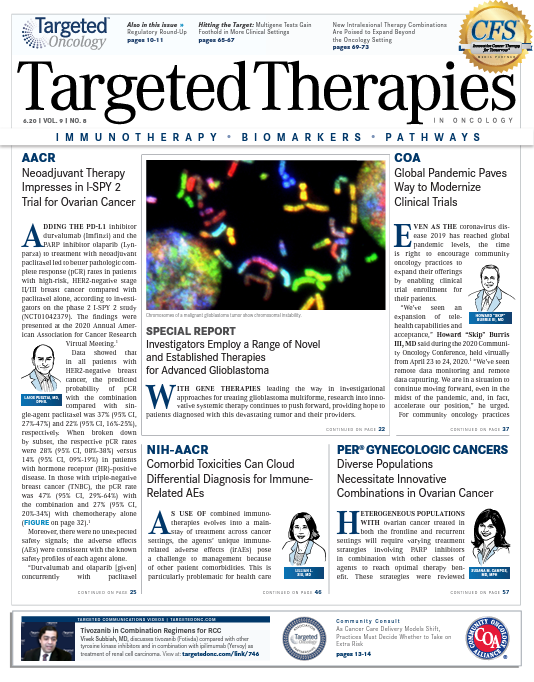Global Pandemic Paves Way to Modernize Clinical Trials
“We’ve seen remote data monitoring and remote data capturing. We are in a situation to continue moving forward, even in the midst of the pandemic, and, in fact, accelerate our position."
Howard “Skip” Burris III, MD

Even as he coronavirus disease 2019 has reached global pandemic levels, the time is right to encourage community oncology practices to expand their offerings by enabling clinical trial enrollment for their patients.
“We’ve seen an expansion of telehealth capabilities and acceptance,” Howard “Skip” Burris III, MD said during the 2020 Community Oncology Conference, held virtually from April 23 to 24, 2020.1 “We’ve seen remote data monitoring and remote data capturing. We are in a situation to continue moving forward, even in the midst of the pandemic, and, in fact, accelerate our position,” he urged. For community oncology practices looking to expand their offerings, enrolling patients on clinical trials has 2 advantages. It allows more patients and treating oncologists to access exciting research by bringing early phase studies and novel trial designs to this setting and contributes to accelerated drug development by encouraging expansion cohorts. Opening up the community setting to clinical trial research allows greater access for patients with cancer to receive cutting-edge therapies where they are being treated and managed."
We’ve got to take the trials to the patients and to the physicians who are caring for them,” said Burris, chief medical officer and president of clinical operations at Sarah Cannon Research Institute in Nashville, Tennessee.1
With this shift, Burris, who is also the current president of the American Society of Clinical Oncology (ASCO), said the advantages of enrolling patients on to clinical trials in the community setting has far-reaching opportunities.
Not only does it benefit the individual patient and promote drug development, it helps oncologists better understand the biology of cancer so that the aggregate data collected can reveal why certain patients are resistant to immunotherapy and identify subsets of patients who respond better or don’t respond well.
Case in point, enter TRK fusions and KRAS mutations. A greater understanding of these aberrations, both difficult pathways to treat until recently, has resulted in the development of drugs to inhibit these proteins. For tumor-agnostic treatments, expansion of clinical trials into the community setting has real-world opportunities. Burris noted the larotrectinib (Vitrakvi) drug development story, citing 2 patient experiences.2
In 1 case, after disease progression, it was discovered through molecular testing that the patient had a TRK fusion. This patient had an excellent response to larotrectinib.
In a less common case, Burris described a juvenile patient with breast cancer who was identified as having a TRK fusion. After undergoing 4 lines of chemotherapy and repeated resections, the patient received larotrectinib as part of an expanded-access program.2 She had a positive response to the agent.
“The rapidity of response by the patient is how a targeted agent like larotrectinib is supposed to work,” said Burris.
The previously “undruggable” KRAS mutation and the subsequent discovery of druggable targets is another example of the benefit of expandable cohorts that include the community oncology setting. KRAS appears prominently in a number of gastrointestinal and thoracic malignancies, Burris said.
“There are multiple variations of KRAS, and as a result, there are a number of agents that are both in the clinic and in the laboratory undergoing development,” he said. “It’s the right time for community oncology practices to understand what specific KRAS mutation patients have so that they can match the appropriate therapy,” Burris said.3
The first step in expanding the community oncology practice is to begin understanding the power of aggregating data. This takes the form of molecular testing and the growing interest in liquid biopsy.
“We are seeing more oncologists [using] tumor tests for their patients at the time of diagnosis, as opposed to waiting for patients to undergo multiple lines of therapy,” Burris said.
A community practice that demonstrates an aptitude for aggregating data and understanding the importance of those data is looked upon favorably by biopharmaceutical companies, Burris said. “It helps these companies determine if your practice is a potential site for participating in a clinical trial.”
Overcoming Challenges
Burris cautioned that having the infrastructure in place to handle the amount of data generated from molecular testing and profiling is paramount to launching an effective clinical trials program in the community setting. A comprehensive program should include e-signature capabilities, document management, molecular profiling, electronic medical records, and clinical trial management systems (FIGURE).1
Sarah Cannon Research Institute has adopted the GenoSpace platform, which helps to converge clinical research and clinical care that provides cohort-driven analyses. Data collected from the patient’s electronic medical records, along with molecular profile analysis carried out by Foundation Medicine and Caris Life Sciences, are aggregated in real time. Using these data, clinical insights are generated, which provide oncologists with an actionable item. “It is wisdom and understanding of what is best for your patients,” Burris noted.
“The ability to aggregate the data and have a conversation with the patient and biopharmaceutical company can move community oncology practices to the front of the line as we begin to bring these trials to our patients,” Burris said.
At the research institute, as clinical trials start in phase 1 and move on to expanding cohorts, Burris noted a few observations. He said the traditional phase 2 trial is going away because of expanding cohorts in phase 1 and noted that sometimes drugs are approved based on a large phase 1 effort. Second, expansion cohorts are enrolling rare tumor types, or patients with minimally invasive or untreated diseases. Third, multihistology studies are becoming increasingly common.
Broadening Patient Population
One criticism associated with clinical trial research is that the patient populations who participate don’t reflect real-world patients, Burris said. A real-world analysis carried out by R. Donald Harvey, PharmD, BCOP, and colleagues, noted that nearly double the number of patients with advanced non–small cell lung cancer would be eligible for clinical trial enrollment if a broader set of eligibility criteria proposed by ASCO and Friends of Cancer Research were implemented, according to data presented at the 2019 ASCO Annual Meeting.4
The study used enrollment criteria proposed in 2017 to consider 10,500 patients whose records were drawn from ASCO’s CancerLinQ database. They found that 98.5% of patients would be accepted for a non–small cell lung cancer trial under the expanded criteria versus 52.3% under traditional criteria. This means that just 1.5% of the patients considered would be rejected for clinical trial participation.
“Broadening eligibility will enable patients to participate in clinical trials, make trial populations more representative, and results more generalizable, and accelerate drug approvals,” Burris concluded.
References:
1. Burris H. The now and future of clinical trials in the community oncology setting. Presented at: 2020 Community Oncology Alliance Annual Conference; Virtual; April 23-24, 2020. https://bit.ly/2VZoDBd
2. Hong DS, DuBois SG, Kummar S, et al. Larotrectinib in patients with TRK fusion-positive solid tumours: a pooled analysis of three phase 1/2 clinical trials. Lancet Oncol. 2020;21(4):531‐540. doi:10.1016/S14702045(19)30856-3
3. Mullard A. Cracking KRAS. Nat Rev Drug Discov. 2019;18(12):887‐891. doi:10.1038/d41573-019-00195-5
4. Harvey RD, Rubinstein WS, Ison G, et al. Impact of broadening clinical trial eligibility criteria for advanced non-small cell lung cancer patients: real-world analysis. J Clin Oncol. 2019;37(suppl 18; abstr LBA108). doi: 10.1200/JCO.2019.37.18_suppl.LBA108

Survivorship Care Promotes Evidence-Based Approaches for Quality of Life and Beyond
March 21st 2025Frank J. Penedo, PhD, explains the challenges of survivorship care for patients with cancer and how he implements programs to support patients’ emotional, physical, and practical needs.
Read More